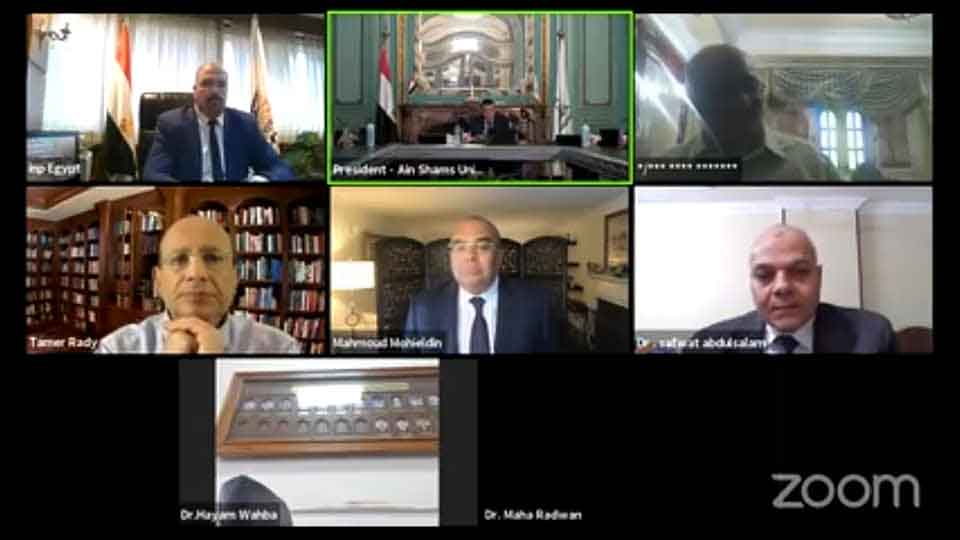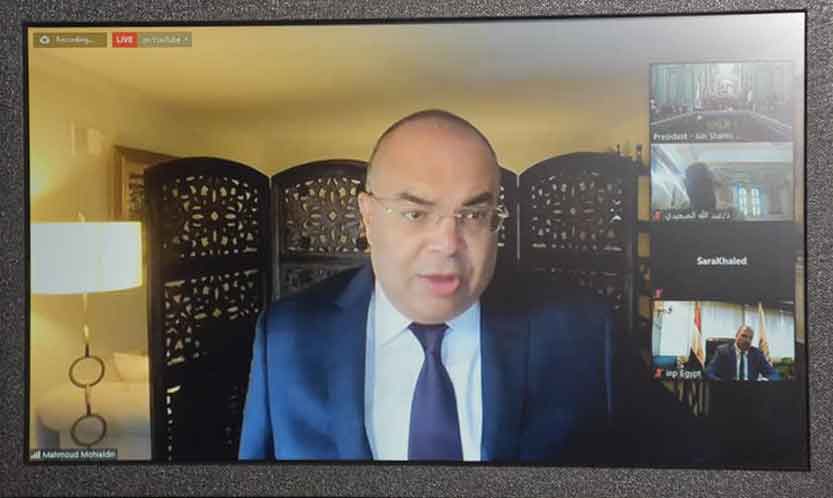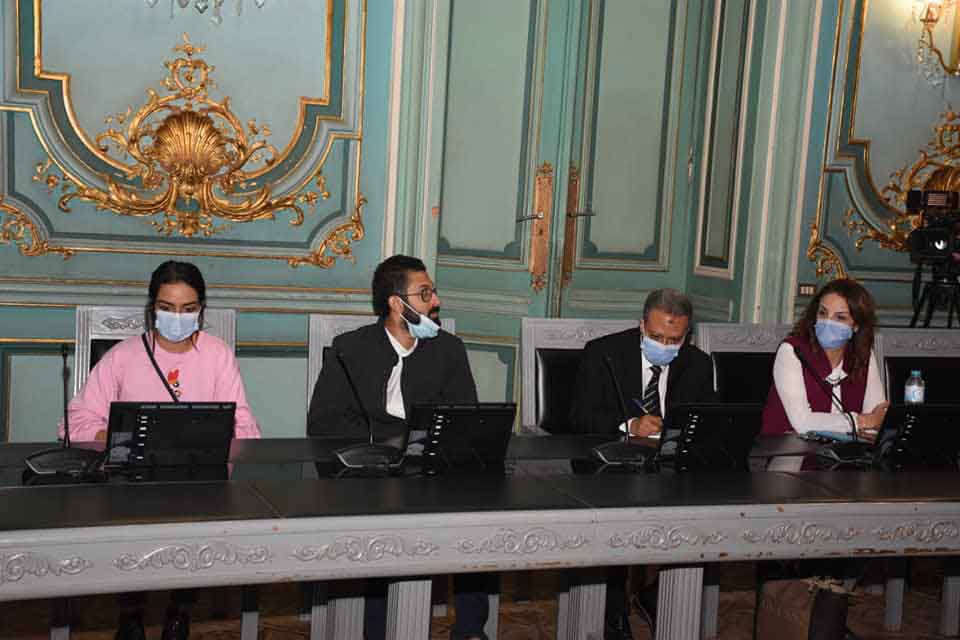Dr. Mahmoud Mohi Eldin outlines the parameters of the Egyptian and global economy's recovery from the impacts of Covid-19
Ain Shams University organized a webinar on the impact of Covid-19 on the Egyptian and international economy, opportunities and challenges, with the participation of Executive Director of the International Monetary Fund and Head of the National Planning Institute...
Ain Shams University, headed by Prof. Dr. Mahmoud El-Metini, President of the University, organized a webinar on the impact of Covid-19 on the Egyptian and international economy, organized opportunities and challenges with the participation of Prof. Dr. Mahmoud Mohieldin, Executive Director of the International Monetary Fund, Prof. Dr. Alaa Zahran, Head of the National Planning Institute, Academy of Scientific Research, Prof. Dr. Khaled Kadri, Dean of the Faculty of Business, Prof. Dr. Hayam Wahba, Vice Dean of the Faculty of Business for Graduate Studies and Research, and a large number of professors of the Faculty of Business and specialists in economic affairs. The dialogue was moderated by Prof. Dr. Yaman Al-Hamaki, Professor of Economics at the Faculty of Business, where he welcomed Prof. Dr. Mahmoud El-Metini congratulated Dr. Mahmoud Mohi Eldin, congratulating his Excellency on the position of Executive Director of the International Monetary Fund and a member of its Board of Directors representing Egypt and the Arab Group, and praised his experience as a former Minister of Investment with a great deal of experience in the economy, as he has for 10 years represented Egypt in many World Bank and International Monetary Fund forums pointing to his contribution with Ain Shams University in establishing a faculty specializing in global affairs of economics and political science, and he also thanked all participants from bodies, institutions and researchers from inside and outside Egypt.
He expressed his hope that this meeting would yield knowledge of the current and future situation of the Egyptian economy in particular and the international community in general, and its repercussions on the Egyptian economy.
Prof. Dr. Youmen Al-Hamaki, professor of economics at the Faculty of Commerce, explained that this event comes within the framework of the university administration's direction to support development efforts, adding that there have been many studies to determine the effects of Covid-19 on the performance of the Egyptian economy, and how to activate its performance, noting that external shocks affect the economy. Egypt was able to provide a distinguished economic performance during the Covid-19 pandemic, but the global financial crisis negatively affected the performance of most developing countries.
In his speech, Prof. Dr. Mahmoud Mohi Eddin expressed his thanks for this invitation from a prestigious university such as Ain Shams University headed by Prof. Dr. Mahmoud El-Metini, explaining the role of the institutional and educational dimension in addressing some issues related to sustainability, innovation, investment, competitiveness and digital transformation, and how to develop a policy to deal with such crises and shocks without wasting the possibilities of progress and development and continued growth.
His Excellency reviewed the economic reality around the world; Stressing the importance of not relying on one or two indicators to infer the extent of progress, improvement or decline of economic performance, explaining the idea of focusing on the goal with multiple indicators to measure performance.
He pointed out that Covid-19 virus is not only an epidemic, but it disrupts the movement of the economy and life in general.
 |
 |
 |
His Excellency explained that global economic growth has lost 5% compared to last year, and that the global economy is in a contraction with expectations of recovery in the next year, and this is related to the ability to contain the second wave of the virus, in addition to the decline in remittances of workers abroad and direct financial investments globally by 40% The global trade movement is still fluctuating, as it has also declined by 13-30%, along with an increase in the global poverty rate, as the number of poor people increased for the first time since 1998 and the severity of hunger increased to nearly 250 million people around the world, in addition to The loss of 495-510 million job opportunities, all this coincided with the fourth global wave of debt, for both the private and government sectors, led to huge increases that exceeded 331% of global income.
As for Egypt, Prof. Dr. Mahmoud Mohi Eldin made a comparison of the Egyptian economic situation with the countries of Vietnam and Cambodia since the beginning of this century in terms of economic and growth rates, explaining that there are a number of similarities with Egypt, and the importance of cooperation with this unbridled and increasing rise coming from Asia, explaining that the population Vietnam is close to the Egyptian population.
His Excellency pointed out that the economic reforms in Vietnam have started since 1986 without interruption, while Cambodia has started the economic reform without interruption in 1995 with a growth rate of 7% for both of them, while in Egypt the growth rate was greater than Vietnam and Cambodia, but there was a retreat for periods, explaining that In the last three years, the rate of growth has returned without interruption, especially after 2016, stressing the importance of continuing economic growth without interruption and the extent of its positive impact on the Egyptian economy.
He said that Egypt exports about $ 35 billion, half of them in oil and gas, and a quantum leap must take place in order for our exports to reach the challenge of $ 100 billion exports to Egypt, which is a very ambitious figure, which requires multiplying the per capita value of exports in three times, adding that, given the structure of exports We will find that the agricultural sector has begun to improve relatively, and there is some change in the manufactured goods sector, indicating that it is necessary to know the export obstacles to work on solving them, especially as the world is moving towards the East.
As for the other side of the economic dimension, it is foreign direct investment, explaining that it was at its best in the period from 2005 to 2008, then declined in 2013 before it resumed again in the past four years, as well as the state and individuals saving for financing in a way that reduces borrowing from abroad.
He pointed out that in order to reach the goals of sustainable development and reach to improve the economic situation and reach the challenge of $ 100 billion in exports to Egypt, his sovereignty determined four levels that must be reached: global, regional, national and local level, and the use of the advantages of the centralized and decentralized system using technology and continuous monitoring in what is known Now with the localization of development, he added that in order for the development to take place, investment must be made in sustainable development and infrastructure by investing in education, the health system and comprehensive health care, skills development, innovation, and infrastructure that includes controlling information and data systems, and that the state has its own platforms and information network. And the ability to manage it as well as the ability to invest in artificial intelligence, stressing that this is impossible to happen in the presence of weak infrastructure, pointing out that what is optimistic is that the political leadership in Egypt is interested in improving the infrastructure during the last period through roads and buildings, electricity and energy and natural gas lines, which can take place a jumpstart growth, especially if it is linked to the process of localization of development in practice Industrialization in the governorates, and that this manufacturing is export-oriented even if it is sold inside the local market, especially since the Egyptian local market is a huge market, praising Egypt's role in the field of social solidarity in its various forms.
At the conclusion of his speech, Dr. Mahmoud Mohi Edlin presented a summary to get out of the crisis that the world is currently facing is summarized in the necessity of a balance between protecting our lives and maintaining the standard of living and this is a global challenge, not to rush with the emergence of Covid-19 virus vaccine until it spreads and reaches the whole world, it is necessary to try to get out of the recession until It does not turn into a depression, the absence of a global debt crisis, cooperation in the field of digital transformation and digitization.
He also stressed the importance of the role of world trade and the World Trade Organization in reforming it, especially with regard to the restoration of global economic activity, and stressed that the new role of countries goes beyond the role of watchdogs, while at the local level, he directed his sovereignty to build on what we have achieved in our experience with the first wave of the Covid-19 virus. The necessity to accelerate the increase in investment by at least 35% of the national income or gross domestic product to achieve the goal of 100 billion dollars in exports, which requires a quantum leap to attract direct investment to reach 10% of the national product, complete the measures that have begun to improve the use of public debt Digital transformation and digitization is not only in manufacturing and production services, but it has become a way of life for society, as well as the localization of development, as we are in a new world, along with increasing the role of the state where it must be clear, and we must realize that having a degree of flexibility has become a duty. And, defining the goal is more important than how to achieve it. The economy now has rules that enable us to rebel against the rigid ideological molds that have disrupted more than they reported, the importance of public investments, according to the IMF report. An increase of 1% of public investment can increase private investment by 10% and increase the employment rate in society by 1.2%. All this cannot be achieved without relying on the principles of governance, stability and security.

.svg)



